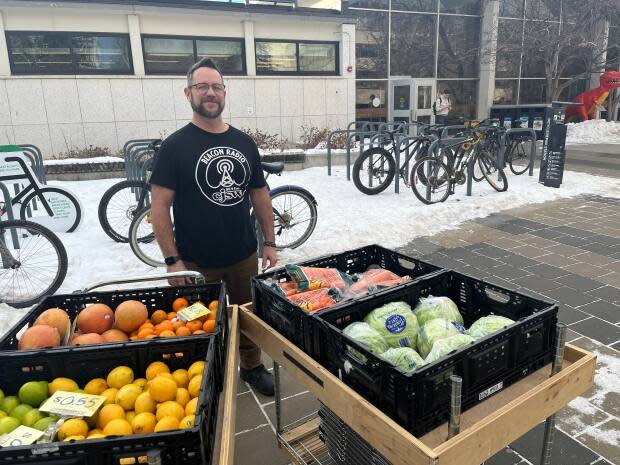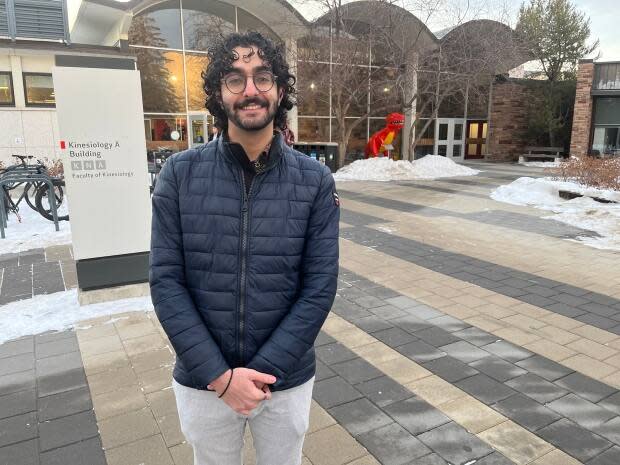Facing rising food and housing costs, Calgary students support each other

In the kinesiology building at the University of Calgary, students pause on their way to class to shop at the Fresh Routes mobile market.
It makes a weekly stop on campus, selling fresh fruits and vegetables at low costs.
Martin Robillard, a route operator for Fresh Routes, says the organization was recently invited back onto campus after discontinuing their stops during the COVID-19 pandemic.
"They saw a need to bring us back, and see how we could really help their students save money," he said.
Initiatives like these help provide nutritious options on campus at a time when the high cost of living means students are facing tough decisions.
"I think it's great that there are these opportunities and there are great options and healthy vegetables for students to purchase," said Miki Rowbottom, a 24-year-old electrical engineering student.
"We don't want to have to sacrifice our health just to pay tuition."

While students struggle, some say there aren't enough externally-funded supports like these available. Instead, they're having to rely on each other.
Choosing between food and education
Ermia Rezaei-Afsah says he's heard of students, including his own friends, who take semesters off or drop out altogether because they can't afford tuition along with the costs of everyday life.
"I know that a lot of people have a pull-yourself-up-by-the-bootstraps mentality, and I can understand why," he said.
"But you can't really expect a student who isn't eating, who isn't functioning, who's just struggling all around and has no control over it, to pull themselves up by the bootstraps."
The 22-year-old history and anthropology student says he's normalized skipping meals to save money, and sees other students making the same choice.

Rezaei-Afsah wants to see governments work with the university to create meal programs on campus, something he's heard of potentially happening through student-led initiatives using grants awarded by the Students' Union.
But he says it's unfair for that burden to be carried by the people struggling.
"That's again using a non-profit's money, that's again making the students do the work," protested Rezaei-Afsah.
"And I feel like maybe the province and the university could do a lot more in regards to just creating these bare necessities that students can access."
Support among campus community
Siraj Shah says in the face of the current hard times, students have come together to help each other.
"That's one of the best things about campus, about any campus, not just the University of Calgary campus, is the fact that students often like to support one another."
He gives credit to student-led organizations for helping feed their community for free.
"A lot of students, you know, they don't have the resources to pay for food, so they're getting free food from various different clubs on campus who collect donations and those are run by students who have faced those struggles themselves," said the 19-year-old international relations student.
Shah also has a background in real estate.
Realizing housing costs have become another major concern for many, he used that knowledge to contribute to the campus community by hosting a housing workshop.
"The focus of that was, how to find a place that's affordable and what to look out for, your rights as a tenant and so forth."
Shah, like Rezaei-Afsah, hopes to see more support coming from both the municipal and provincial governments.
He says the City of Calgary could help ease the housing burden by easing the requirements for legal basement suites.
As for the province, he says budget cuts to post-secondary institutions and student grants are being felt on campus and need to be accounted for.

While the province is soon rolling out its affordability payments, the majority of students won't be eligible for the extra help.
"It's excellent that the provincial government is taking a step to help affordability across the province, that's definitely not a negative thing at all," said Shah.
"But the one thing I will say is the fact that if students are being cut off the list, it makes us as students feel a little bit left out considering the fact that we are the future of the province."
As the price of university continues to stack higher, both Shah and Rezaei-Afsah worry about what that means for the next generation.
The future of the province
Shah says he sees more students considering gap years in order to sustain themselves, and what should be a four-year degree turning quickly into a six-year ordeal.
Between the time, effort, and cash needed to complete a degree, he's concerned fewer young people will choose the post-secondary path.
"They see some of these issues, and they're kind of diverted away from post-secondary education just because of the fact that they would much rather go into something else where they can make money right off the bat, rather than put that huge financial burden on [themselves]."
Rezaei-Afsah says there are many reasons for people outside of campus communities to be invested in the success of post-secondary students, aside from the link between better educated populations and a higher GDP.
"We want the next generation to be well off. We want them to be able to buy houses," he said.
"You want, for example, them to be able to hold up the Canada Pension Plan going forward in a couple of years when we're going to get a lot of retirements."
In a statement from the University of Calgary Students' Union, the organization noted that a recent survey "showed 18 per cent of students may not be able to afford their tuition next year, with another 67 per cent saying tuition increases are putting a moderate to extreme strain on their finances."
Because of that, the SU is advocating against a fourth consecutive tuition increase being considered for approval by the university this week.
"Students will have to compromise on housing or food to continue their education," the statement reads.
"That's not acceptable in a province like Alberta."
Young Calgary
CBC Calgary is looking for more young voices to help shape the news.
You can join our text messaging community to share your ideas.
Highlight the heroes in your life. Tell us about the challenges you're facing, and make suggestions on what you'd like to see CBC Calgary cover next.
It could be fun, and we promise to keep you in the loop the whole way. It's free and confidential. Unsubscribe any time.


